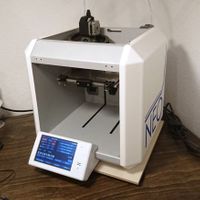Duet 3 StealthChop 2 Tuning for Nema23
-
@fractalengineer said in Duet 3 StealthChop 2 Tuning for Nema23:
Well again the steppers are running free; nothing connected to them
Have you tried connecting them to a load to see how they behave?
-
Hi @Phaedrux , yes mounting them was the first thing I did upon reception; when the problem occured I removed the belts to insulate the gantry binding possibility and kept testing this way to prevent crashing it due to the stalls
-
@dc42 did you get any insights from the torque curve?
Is there any chance of getting these steppers to work or is it just that the Duet3 can't drive Nema23?
-
I've been able to get some nice, big Moons MS23HA8L4360 NEMA23 steppers working well this weekend. I've tested them up to 400mm/sec with acceleration at 4000mm/sec², and suspect they could go higher if I drop microstepping down to x16.
Config looks like:
; Drives M569 P0.1 S1 D3 ; Y / Front 0.1 goes forwards 0.9° Moons MS23HA8L4360* M569 P0.2 S0 D3 ; X / Rear 0.2 goes backwards 0.9° Moons MS23HA8L4360* ... M350 X32 Y32 Z32 E32 I1 ; configure microstepping with interpolation ; Steps on X & Y ; = steps per rotation / (pulley teeth * belt spacing) * microstep multiplier ; 0.9° degree stepper has 400 steps per rotation, 1.8° stepper has 200 M92 X{400 / (18 * 2) * 32} Y{400 / (18 * 2) * 32} Z6400.00 E1674.00 ; set steps per mm ; Motor current ; = Max stepper rating in milliamps * 0.8 ; Adjust multiplier as desired. Lower is quieter, while higher means more torque, noise, and heat. ; ...but never over 1.0! (and even over 0.8 may lead to excess heat) M906 X{3600 * 0.8} Y{3600 * 0.8} Z{2000 * 0.8} E1100 I30 ; set motor currents (mA) and motor idle factor in per cent M84 S30 ; Set idle timeout ; Speeds M203 X24000.00 Y24000.00 Z480.00 E3600.00 ; set maximum speeds (mm/min) M201 X4000.00 Y4000.00 Z80.00 E1500.00 ; set accelerations (mm/s^2) ; Jerk and accelerations ; M566 X500.00 Y500.00 Z20.00 E1500.00 ; set maximum jerk (instantaneous speed changes) (mm/min) M566 X300.00 Y300.00 Z20.00 E1500.00 ; set maximum jerk (instantaneous speed changes) (mm/min) M204 1000 T2000 ; use 1000mm/s² acceleration for print moves and 2000mm/s² for travel moves ; Trinamic Drive Tuning ; Tune tpwmthrs (V) so stealthchop runs at appropriate speeds ; and tune thigh (H) to avoid shifting into fullstep mode M569 P0.1 V40 H5 ; X - Set tpwmthrs so StealthChop runs up to 105.5mm/sec M569 P0.2 V40 H5 ; Y - Set tpwmthrs so StealthChop runs up to 105.5mm/sec ... M915 X Y T20000 ; Set CoolStep threshold super lowOne thing I've noticed is that using
M915 T...with low values to disable CoolStep leads to some nasty, loud noises. I suspect the current reduction that CoolStep does is beneficial in reducing back EMF. -
@evan38109 Yo Evan
Thanks a lot for this; very clever config file.
Looks like increasing Coolstep did help with speeds; I can go up to about 300mm/s before it stalls,
However Stealthchop doesn't seem to be running at any speed; it's all SpreadCycle now
-
Okay looks like lowering the M915 T value to the 50s reenables Stealthchop
Now the Stealthchop seizure speed is up to just below 100mm/s
I'm still confused as to how to setup the switch from StealthC to SpredC; looks like it's always choppy and noisy around the transition speed
-
@fractalengineer said in Duet 3 StealthChop 2 Tuning for Nema23:
StealthC to SpredC; looks like it's always choppy and noisy around the transition speed
the datasheet mentions that the transition between the two should be set to a speed that manages the Jerk caused by phase shift. Higher speed transition = more noticeable transition.
https://www.trinamic.com/fileadmin/assets/Products/ICs_Documents/TMC5160A_Datasheet_Rev1.14.pdf
see page 65
-
@T3P3Tony Hi Tony,
Yep I do remember reading that in the datasheet and I can reproduce this specific "caklonk" jerk when switching from M569 D3 to D2 or by changing M915 T value
What I'm referring to is more of a crackling sound around the transition speed
Here's how it runs currently; fastest speed is only 240mm/s
-
@fractalengineer said in Duet 3 StealthChop 2 Tuning for Nema23:
Looks like increasing Coolstep did help with speeds; I can go up to about 300mm/s before it stalls,
However Stealthchop doesn't seem to be running at any speed; it's all SpreadCycle nowCoolstep and spreadCycle are not compatible. In some ways, coolStep is a more primitive version of stealthChop.
It sounds to me that the motor back EMF may still be too high for the supply voltage you are using. This can be a problem when using 0.9deg motors.
-
@dc42 But the EMF calculator says back EMF is green (17.6V out of the near 30V supplied) and these steppers can still go at least twice faster than the speed they are currently running...
Would plugging capacitors in parallel to VIN help with absorbing some of that back EMF?
-
For posterity --
I was misunderstanding how CoolStep interacted with the other modes. Thank you for clarifying.
I've now gotten in the habit of just effectively disabling CoolStep with
M915 X Y Z E T1. I've not been able to find any situations on either of my printers where CoolStep works materially better than SpreadCycle. (That's not to say they don't exist, I just haven't found them!) -
I was pointed to this thread from another by DC42 - where it indicated the OP solved an issue by making some changes. I see a lot of hchanges et al ... but it caps out at 42 posts and I dont see the OP indicating a resolution ?
Almost all these StealthChop to Spreadcycle motor banging threads - Have No Resolution defined in the threads ... Troublesome.
Is there a resolution?
-
So for folks trying to understand how tpwmthrs is calculated, and especially how to convert it to mm/s...
- 12,000,000 / (256 * tpwmthrs) = steps / second
- You need steps per mm from M92... be careful with units...
- Then multiply mm/step * step/second
Using evan38109's config as an example:
M350 X32 Y32 Z32 E32 I1 ; configure microstepping with interpolation M92 X{400 / (18 * 2) * 32} Y{400 / (18 * 2) * 32} Z6400.00 E1674.00 ; set steps per mmThey're using 32 microstep units, and M92 gives microsteps per mm.
- 400 / (18 * 2) * 32 = 355.55 microsteps / mm
- 355.55 / 32 = 11.11 steps / mm
So for 40 tpwmthrs...
(1 mm / 11.11 steps) * (12,000,000 / (256 * 40)) = 105.5mm/s
- The 12,000,000 comes from the clock frequency, tpwmthrs is in units of clock period
- Check out the datasheet: https://www.trinamic.com/fileadmin/assets/Products/ICs_Documents/TMC2160A-datasheet_Rev1.06.pdf
-
 undefined fractalengineer referenced this topic
undefined fractalengineer referenced this topic
-
 undefined NeoDue referenced this topic
undefined NeoDue referenced this topic